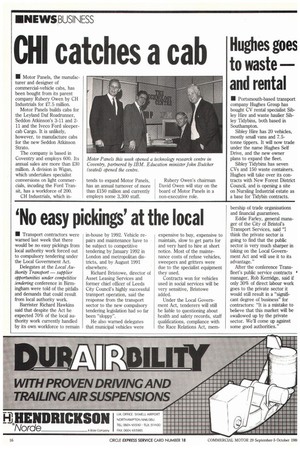'No easy pickings' at the local
Page 14

If you've noticed an error in this article please click here to report it so we can fix it.
• Transport contractors were warned last week that there would be no easy pickings from local authority work forced out to compulsory tendering under the Local Government Act.
Delegates at the Local Authority Transport — supplier opportunities under competitive tendering conference in Birmingham were told of the pitfalls and demands that could result from local authority work.
Barrister Richard Hawkins said that despite the Act he expected 70% of the local authority work currently handled by its own workforce to remain in-house by 1992. Vehicle repairs and maintenance have to be subject to competitive tendering by January 1992 in London and metropolitan districts, and by August 1991 elsewhere.
Richard Bristowe, director of Asset Leasing Services and former chief officer of Leeds City Council's highly successful transport operation, said the response from the transport sector to the new compulsory tendering legislation had so far been "sloppy".
He also warned delegates that municipal vehicles were expensive to buy, expensive to maintain, slow to get parts for and very hard to hire at short notice. Most of the maintenance costs of refuse vehicles, sweepers and gritters were due to the specialist equipment they used.
Contracts won for vehicles used in social services will be very sensitive, Bristowe added.
Under the Local Government Act, tenderers will still be liable to questioning about health and safety records, staff qualifications, compliance with the Race Relations Act, mem
bership of trade organisations and financial guarantees.
Eddie Farley, general manager of the City of Bristol's Transport Services, said "I think the private sector is going to find that the public sector is very much sharper in taking on the Local Government Act and will use it to its advantage."
After the conference Transfleet's public service contracts ' manager, Rob Kerridge, said if only 30% of direct labour work goes to the private sector it would still result in a "significant degree of business" for contractors: "It is a mistake to believe that this market will be swallowed up by the private sector. We'll come up against some good authorities."
















































